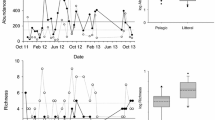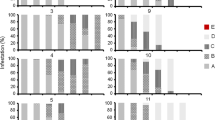Abstract
We experimentally investigated the effect of different densities of the burrowing, deposit-feeding amphipod Monoporeia affinis on the recruitment of zooplankton from benthic resting eggs. Intact sediment cores with in situ density and species composition of zooplankton resting eggs and benthic fauna were collected in the northern Bothnian Sea, part of the Baltic Sea. We removed as many M. affinis as possible from the cores and then added different numbers of M. affinis to the cores to generate a range of densities. The cores were exposed to different densities of M. affinis for either 3 or 40 days, after which the hatched zooplankton was registered. One subset of the cores were initially incubated under low temperature (2–3 °C, to prevent hatching) for 37 days (the resting phase), to allow for effects of M. affinis on unhatched resting eggs. These cores were then incubated under higher temperature (13 °C) for 3 days (the hatching phase), to induce hatching and allow for effects on hatching or hatched specimens. In a second subset of cores with the same time and temperature schedule, the M. affinis density was experimentally reduced at the start of the hatching phase, to evaluate the effect of M. affinis during the hatching phase. To a third subset of cores, we immediately initiated the hatching phase, without an experimental resting phase, to evaluate the effects induced during the resting phase. The most common zooplankton species that hatched was Eurytemora affinis (Copepoda), followed by Bosmina longispina maritima (Cladocera). In all cores that were subjected to a resting phase, the numbers of hatched E. affinis were log-linearly negatively related to density of M. affinis. An increase of M. affinis density from 1,000 to 5,000 individuals m−2, normal field densities, reduced the hatching by 60–70%. The negative impact was mainly exerted during the hatching phase, suggesting predation on, burial of or physical injury of hatching nauplii or eggs in a late development stage as likely mechanisms. Also, the number of B. longispina maritima that hatched was reduced by M. affinis during the hatching phase, but no clear relation to density of M. affinis could be identified. The results show that M. affinis can reduce recruitment to zooplankton from benthic resting eggs. Such impact by the benthos on resting stages of zooplankton is therefore a potentially significant link between the benthic and pelagic systems.
Similar content being viewed by others
Author information
Authors and Affiliations
Additional information
Received: 10 August 2000 / Accepted: 13 November 2000
Rights and permissions
About this article
Cite this article
Albertsson, J., Leonardsson, K. Deposit-feeding amphipods (Monoporeia affinis) reduce the recruitment of copepod nauplii from benthic resting eggs in the northern Baltic Sea. Marine Biology 138, 793–801 (2001). https://doi.org/10.1007/s002270000498
Issue Date:
DOI: https://doi.org/10.1007/s002270000498




